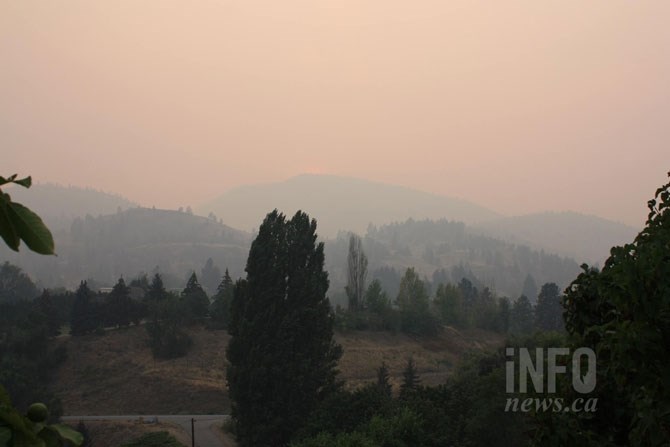
(STEVE ARSTAD / iNFOnews.ca)
August 26, 2015 - 8:30 AM
VANCOUVER - Smoke from wildfires in Washington state has eased up in parts of southern British Columbia, but forecasters were expecting sooty air to continue blowing into the region for several days.
Metro Vancouver cancelled its air quality advisory Tuesday, saying winds moved contaminated air away, clearing the eastern Fraser Valley.
But smoke remained thick throughout the Kootenay and Columbia regions in southeast B.C., said provincial fire information officer Ryan Turcot.
He said the heaviest amount of smoke was predicted to cloak the southern Interior on Wednesday.
There was no indication that Vancouver's improved air quality would extend elsewhere, he said.
"Smoke certainly is still in the forecast for the next three to four days. Not so much (Vancouver) Island but certainly anything inland, in the south."
The province has been coping with one of its worst fire seasons in years. On Saturday, smoke from the massive Stickpin fire, about 4.5 kilometres south of the border, began drifting into British Columbia.
In Kelowna, a shelter announced round-the-clock openings to help the homeless get out of the smoke.
"It was just like we were blanketed in pea-soup fog, but it was smoke," said Randy Benson, executive director of the Kelowna Gospel Mission. "Pretty unbelievable, I've never seen it this thick here."
Most people can avoid the effects of oppressive smoke by staying inside, but that's not an option for everyone, Benson said.
"When the climate is a health issue, we want to make sure people have a safe place to be indoors."
He said many homeless people already have weakened immune systems, and the smoke can cause sore eyes while aggravating breathing and sinus problems.
Benson said the smoke was worse than during wildfires around the city in 2003, when hundreds of homes were destroyed and tens of thousands of people were forced out of their residences.
A total of 182 wildfires are burning across the province, with 10 new blazes ignited on Monday. All but two of the new fires were human-caused.
About 2,000 people are fighting the blazes, either in the field or from command posts. Another 600 contractors are working alongside regular crews.
Twelve notable wildfires were burning in British Columbia on Tuesday.
News from © The Canadian Press, 2015